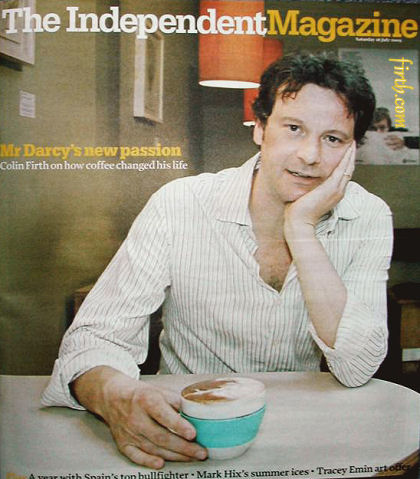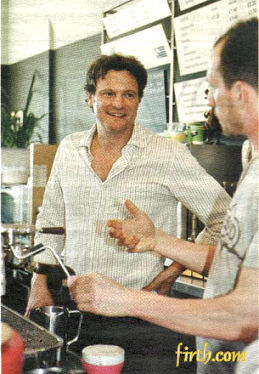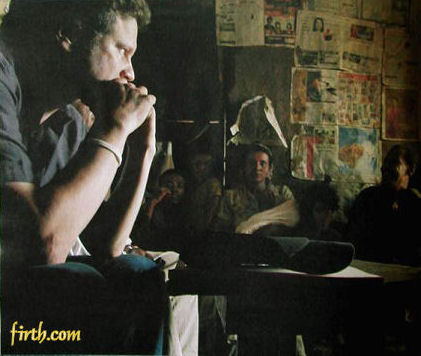Colin Firth:
My toughest
role ever
Colin Firth is one of
Britain's most dashing actors. But now he faces a new challenge:
fighting for the world's poorest coffee farmers. He talks to Marina
Cantacuzino
|

|
How do you tell
consumers that their cappuccinos are driving someone somewhere deeper
into poverty? How do you kick down the doors of the big coffee roasters
until they're shamed into trading fairly? And how do you use celebrity
to make a noise without trivialising the issue? These are just some of
the dilemmas facing Colin Firth since he took on the role earlier this
year as a director of Progreso—a new coffee chain whose appearance on
our high streets may finally provoke Starbucks and its competitors to
recognise the humanitarian crisis that lies behind the coffee they sell.
The vision for Progreso is surprisingly subversive—a global chain that offers individuality
to the customer without pushing the brand, a business that pumps any
value added back into the hands of producers. Giving the coffee growers
of Honduras, Ethiopia and Indonesia a percentage of the business has
never been done before on our high streets. Nor has appointing as a
board member a respected big-name actor, albeit one still best known, a
decade on, for his sodden exit from a pond as Mr Darcy in the BBC
adaptation of Pride and Prejudice—a part that earnt him the epithet "the
male Ursula Andress". Firth's only credential is his burning desire for
change.
If there's one key thing he's learnt, he says, it's that the coffee
market fails the poor. It's a shameful story of complacent governments,
bullying multinationals and millions of coffee farmers around the world
facing economic ruin. Few of life's little luxuries can leave such a
bitter taste in your mouth—and there seems little prospect of
recent events at Gleneagles making much immediate difference.
Firth's position on the board, which until now has been deliberately
underplayed by star, chain and part-owners Oxfam alike, shows a level
of commitment rare among celebrities, whose endorsement is sought like
gold dust by charities; it's also an indication of just how seriously
he takes his new role. This is not a gimmick: Firth has been to
Ethiopia to see Progreso's coffee producers at work, visited Glasgow
where the roasters Matthew Algie operate, and plans to roll up his
sleeves and get his hands dirty too. He has already had his health and
safety training and taken his turn behind the counter as a barista.
"Having Mr Darcy serve the coffee is a practical way of using my
profile without giving everyone earache," he says. Indeed, when he
turned up for work at Progreso's Portobello Road branch last month, it
seems that customers took it fairly in their stride. "People seemed to
think there was nothing more normal than having me serve their
cappuccinos and espressos," says Firth, and he promises to do it again.
 He has been back from Ethiopia for a few
days when we arrange to meet at the café. It's here, on what he
calls "home turf", that he likes to hold his London meetings. Although
Ethiopia has evidently made a powerful impact on him, he's only too
aware that the world doesn't need to hear about yet another celebrity
in Africa, especially after Live8. "If you're going to sustain
commitment to any of this," he says, "there comes a point you can't
feed off the buzz. Even being horrified is a buzz. You've got to get
involved on an ordinary everyday basis." He has been back from Ethiopia for a few
days when we arrange to meet at the café. It's here, on what he
calls "home turf", that he likes to hold his London meetings. Although
Ethiopia has evidently made a powerful impact on him, he's only too
aware that the world doesn't need to hear about yet another celebrity
in Africa, especially after Live8. "If you're going to sustain
commitment to any of this," he says, "there comes a point you can't
feed off the buzz. Even being horrified is a buzz. You've got to get
involved on an ordinary everyday basis."
Progreso looks much like any other slick multinational coffee chain,
but here only fair-trade coffee is on sale. By cutting out the
middlemen, coffee farmers in the developing world get a fairer price,
while consumers know that, unlike at Starbucks, every cup guarantees a
fairer deal for the farmer. Wyndham James, Progreso's chairman and
formerly Oxfam's trading director, explains. "Our motto is sin
café no hai mañana," he says, "which has two meanings in
Spanish—'without coffee, mornings are no good',
and, 'without coffee, there is no future'. That is the story behind
coffee which Progreso wants consumers to understand and care about."
James
is struck by Firth's sincerity and commitment. "He wants to work in
something that makes a real difference," he says. But, quite apart from
being a dedicated board member, James knows that Firth is a powerful
draw to punters. On the day we meet, there is a gentle buzz around him
as he takes his place in the line for a coffee.
That
should come as no surprise. Firth has achieved a reputation—unwarranted, he always maintains—as one of the nation's most eligible
bits of posh, a dashing-but-stoical ladykiller, after starring in Fever Pitch, Bridget Jones's Diary,
parts 1 and 2, and Love Actually.
We start by talking about his trip with Oxfam to Ethiopia—a nation whose future is tied up in
coffee. Witnessing the gross power imbalance between the penniless
farmers and the profiting roasters was the start of what he calls "a
very sobering education". "I'd read all the reports, done my homework,
digested the facts," says Firth, "but actually meeting people whose
dream is simply to earn enough to buy a tin roof or send their kids to
school, makes it real. You're faced with emotional implications, the
sheer and simple unfairness of it all."
Ever since agreeing to support Oxfam's Make Trade Fair campaign two
years ago, Firth has immersed himself in the subject, invested a lump
sum to set up Progreso and even bought shares for the coffee producers.
Earlier this year in Geneva, he personally lobbied the World Trade
Organisation director general Supachai Panitchpakdi, about Oxfam's
campaign, and at a photo-call handed over their Big Noise global
petition with seven million signatures. The Big Noise aims to put
pressure on the big four roasters (Kraft, Sara Lee, Proctor &
Gamble and Nestlé), whose failure to embrace fair-trade
standards fans the flames of global poverty by creaming off profits and
allowing producers to go to the wall. Back home, Firth endeavours to
buy or drink only fair-trade coffee, and the message is getting through
to the rest of the population—certified fair-trade coffee is now the
fastest growing segment of the UK coffee market.
When Oxfam first approached Firth (at a time when the coffee prices had
plummeted to an all-time low) he was reticent to become yet another
celeb banging on about yet another cause: he knows it can backfire
badly on both charity and star. Before now his approach to activism was
radical but low-key. As a long-time supporter of Amnesty and Greenpeace
he's paid his subscriptions, written letters, and been on protest
marches. What changed?
"I was beginning to think I was banging my head against a brick wall
and, by the time Oxfam approached me, I was wondering if perhaps, since
I'm accorded a voice because of the celebrity factor, I should start to
use it," he says. "But it's a great responsibility. There are so many
more qualified voices than mine who don't have a chance of getting
heard. I detest the fact they have to use celebrities to do the jobs
for them but if that's what it takes then that's what I'll do."
On his second day in Ethiopia, Firth came face to face with how awesome
this responsibility is. While visiting the Choche co-operative in the
heart of the Kaffa region, the birthplace of coffee, he is welcomed
with a coffee ceremony (evidence that the golden bean is much more than
just a commodity here). "I was greeted with enormous grace and then
their boss who was high in the union leadership said something that
stayed with me for the rest of the trip. 'Three times we've been
visited by well-meaning people,' he said, 'and nothing has changed.' It
was very chastening and I came to see how close my visit was to being
bogus and ineffectual. I knew I had to have something to say for myself
or I'd just be another disaster tourist. There was no point in giving
empty reassurances, so I told him I couldn't promise anything in terms
of change, but that it might be in my power to get his voice heard. I
asked him what he wanted to tell the consumer."
What Firth heard from the leader of the Coche Co-op, and then again and
again from all the coffee farmers he met, was not an account of extreme
hardship—although there was plenty of evidence of
that—but a plea for a fair price for the
region's top-quality arabica coffee. "The people are so emotionally
bound up with the coffee. Their pleading was not on the basis of
poverty but of quality. 'Give us a fair price, and we'll grow coffee on
every last square centimetre of land,' they were saying."
You sense Firth's uneasiness at having discovered such beauty amid such
deprivation. "We arrived in Addis Ababa and everything felt so raw and
new," he says. "This feeling just grew with all of us as we fell in
love with the place. It's so troubled as a country but the people we
met were friendly and eloquent, which made me feel even more useless.
No one projected misery or despondency—far less than on Oxford Street,
actually. I met the owner of a little wooden hut with 'Art Gallery'
written in crude paint strokes. He showed us his plans to build a
million-pound hotel looking down over Addis. It struck me as a
remarkable that a man who was lucky to have enough to get him to the
end of day still had this kind of dream."
 Since
Firth's return from Ethiopia, the one thing that keeps nagging at him
is that we are all compliant because we are all consumers. "The farmer
at the end of the chain isn't asking for charity, he's just asking for
a fair price," he explains. "Whenever we told Ethiopians that the price
of a cup of coffee on the high-street is as much as £2.75, there
was this incredulous laughter and then they shook their heads with
worldly resignation. It takes 24 beans to make a cup of coffee and yet
in a bad year the producer is selling a kilo of beans for just 5p. So
who is making the profit? Not the farmer." Since
Firth's return from Ethiopia, the one thing that keeps nagging at him
is that we are all compliant because we are all consumers. "The farmer
at the end of the chain isn't asking for charity, he's just asking for
a fair price," he explains. "Whenever we told Ethiopians that the price
of a cup of coffee on the high-street is as much as £2.75, there
was this incredulous laughter and then they shook their heads with
worldly resignation. It takes 24 beans to make a cup of coffee and yet
in a bad year the producer is selling a kilo of beans for just 5p. So
who is making the profit? Not the farmer."
The problem is that, in the developing world, those who depend on
farming to survive are suffering because trade rules are rigged against
them. The solution is simple, according to Wyndham James. "The major
roasters need to commit to help solve the crisis by stopping exploiting
their position in the supply chain," he says. "They should guarantee a
decent price to producers, they should buy more fair-trade coffee and
should improve the quality of all the coffee they buy."
It sounds simple but James, like Firth, Oxfam and the farmers
themselves, knows there is little chance of the roasters doing this
unless pressure is put on them by governments. For this reason, Firth
is now determined to use his fame to give a voice to those who don't
have one. He's also determined that in three years there will be not
two, but 20 Progreso outlets in the UK.
Sitting on the Progreso board is clearly one of his main priorities
these days, even if regular attendance can't be guaranteed around his
filming schedule. "I can't apportion time evenly, not even to my
children," he says, "but if I'm away for six months the board meets
without me, the coffee shops continue to trade, and from wherever I am
I can continue to spread the word."
After spending several hours with Firth, talking intensely about
Progreso, Oxfam and the coffee crisis, he is clearly in this for the
long haul: his reticence is a reflection of his integrity, his passion,
a conviction that Progreso and the issue on which it was founded has to
be taken seriously.
If you want to help make trade fair, sign The Big Noise petition at
www.maketradefair.com
|


 Since
Firth's return from Ethiopia, the one thing that keeps nagging at him
is that we are all compliant because we are all consumers. "The farmer
at the end of the chain isn't asking for charity, he's just asking for
a fair price," he explains. "Whenever we told Ethiopians that the price
of a cup of coffee on the high-street is as much as £2.75, there
was this incredulous laughter and then they shook their heads with
worldly resignation. It takes 24 beans to make a cup of coffee and yet
in a bad year the producer is selling a kilo of beans for just 5p. So
who is making the profit? Not the farmer."
Since
Firth's return from Ethiopia, the one thing that keeps nagging at him
is that we are all compliant because we are all consumers. "The farmer
at the end of the chain isn't asking for charity, he's just asking for
a fair price," he explains. "Whenever we told Ethiopians that the price
of a cup of coffee on the high-street is as much as £2.75, there
was this incredulous laughter and then they shook their heads with
worldly resignation. It takes 24 beans to make a cup of coffee and yet
in a bad year the producer is selling a kilo of beans for just 5p. So
who is making the profit? Not the farmer."